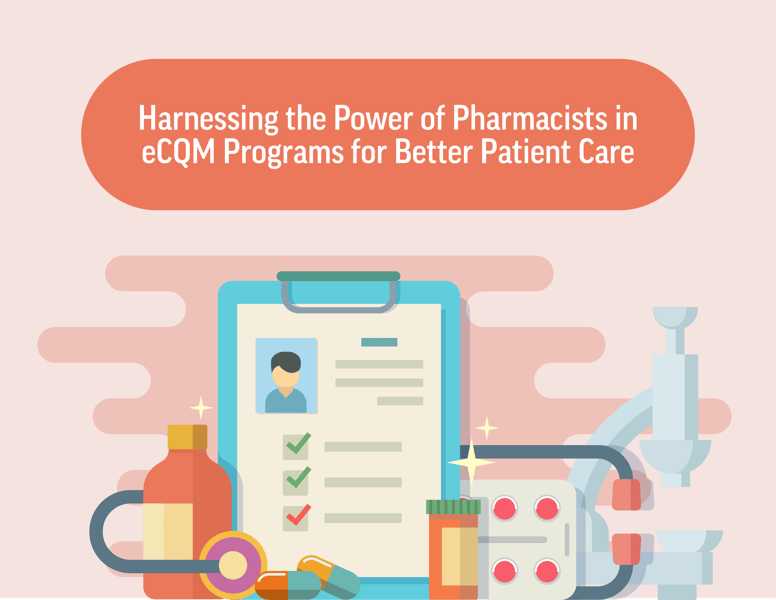Harnessing the Power of Pharmacists in eCQM Programs for Better Patient Care

Pharmacists are unsung heroes in the healthcare industry, playing a crucial role in ensuring medication safety and effectiveness. With the rise of Electronic Clinical Quality Measures (eCQMs), pharmacists have a unique opportunity to showcase their expertise and make a significant impact on patient outcomes.
The Value of Pharmacists in eCQM Programs
Pharmacists possess a wealth of knowledge in pharmacology, drug interactions, and patient care, making them indispensable members of the healthcare team. Their meticulous monitoring of medication regimens, swift identification and resolution of medication-related problems, and dedication to patient education contribute significantly to preventing adverse drug reactions, optimizing medication adherence, and improving overall patient outcomes. By actively participating in eCQM programs, pharmacists can leverage quantifiable metrics to demonstrate their expertise and the positive impact they have on patient care. This is becoming even more valuable as many of the eCQMs are involving medications data capture.
There is now a heavier emphasis on measures involving medications.
- CMS506 – Safe Use of Opioids – Concurrent Prescribing
- CMS104 – Discharged on Antithrombotic Therapy
- CMS71 – Anticoagulation Therapy for Atrial Fibrillation/Flutter
- CMS72 – Antithrombotic Therapy By End of Hospital Day 2
- CMS108 – Venous Thromboembolism Prophylaxis
- CMS190 – ICU Venous Thromboembolism Prophylaxis
- CMS816 – Hospital Harm – Hypoglycemia
- CMS871 – Hospital Harm – Hyperglycemia
- CMS819 – Hospital Harm – Opioid-Related Adverse Events
- CMS996 – ST-Segment Elevation Myocardial Infarction [STEMI] Patients in the ED
Innovative Strategies for Pharmacist Engagement
To effectively engage pharmacists in eCQM programs, it is crucial to provide them with educational opportunities and training sessions. These sessions should cover topics such as eCQM measures, data collection and analysis, and quality improvement strategies. Ongoing training and support should also be provided to keep pharmacists up-to-date on the latest eCQM requirements and best practices. Collaborative partnerships between pharmacists, physicians, and quality teams are essential for successful eCQM implementation. By working together, pharmacists can identify gaps in patient care, develop targeted interventions, and implement evidence-based practices to optimize medication management strategies.
Recognizing Pharmacists' Contributions
Pharmacists deserve recognition for their invaluable contributions to eCQM programs and their efforts to improve the quality of care for patients. Encouraging pharmacists to participate in eCQM research and quality improvement initiatives is crucial. They can contribute to the development and validation of eCQM measures, conduct research studies on the impact of eCQMs on patient care, and actively participate in initiatives aimed at improving the quality of care. By acknowledging and appreciating their contributions, healthcare organizations can further motivate pharmacists to actively engage in eCQM programs.
Overcoming Barriers to Adoption
Despite the potential benefits of eCQMs, there are barriers to pharmacist adoption that need to be addressed. Many pharmacists may not fully understand the value of eCQMs and how they can enhance patient care. To overcome this, healthcare organizations should focus on educating pharmacists about the benefits of eCQMs through workshops, webinars, and other educational programs. Additionally, providing pharmacists with the necessary resources, such as access to technology, data, and support staff, is crucial for their active participation. Creating a culture of change within healthcare organizations is also important, encouraging pharmacists to embrace new technologies and practices while addressing their concerns about workflow impact.
I recently worked with a client whose performance rates were well below average. For over two years, we tried changing documentation, working with providers, and looking for ways to capture the data elements needed to improve their rates. But performance rates did not improve. After some discussion, the Quality Director decided to get Pharmacy involved. They began looking at medication administration, order sets, provider compliance, and provider education. They had meetings with the providers to discover gaps and prescribing challenges. Over a period of one month, their performance rates improved by 25% across all measures. They now have a pharmacist that watches for fallouts for these measures on a weekly basis to monitor stability for pharmacological data elements in these measures.
Future Directions for Pharmacist Involvement
Pharmacists have a critical role to play in the future of eCQMs. Their expertise in medications positions them well to provide valuable insights into the development and implementation of eCQMs that specifically address medication-related outcomes. Future research should focus on developing eCQMs that measure the impact of medication therapy on patient outcomes, such as reducing medication errors, improving medication adherence, and achieving therapeutic goals. By actively involving pharmacists in the development and implementation of eCQMs, healthcare organizations can ensure that these measures accurately reflect the quality of patient care.
Working in healthcare has its challenges. Providers of all kinds work diligently to provide quality patient care. It is discouraging when performance rates do not reflect the work that is done. The community only sees what is reported publicly. If what is being reported is not accurate, then what the community sees does not reflect the true patient care your facility is providing. All the work that providers put into their daily care of patients is not recognized because of erroneous data capture. Our goal is to work with hospitals to make sure that the data is accurate and accurately reflects the patient care that is being provided.
It takes a team. You probably already have a good group on your team representing IT and Quality. If you have not already, it’s a good move to consider adding Pharmacy to your team to get better results, which will more accurately represent the great patient care you provide to your patients.
Medisolv Can HelpThis is a big year for Quality. Medisolv can help you along the way. Along with award-winning software, you receive a Clinical Quality Advisor that helps you with all of your technical and clinical needs. We consistently hear from our clients that the biggest differentiator between Medisolv and other vendors is the level of one-on-one support. Especially if you use an EHR vendor right now, you’ll notice a huge difference.
|



.png?width=352&name=BlogImage_State%20of%20IQROQR%20Survey%20(4).png)

Comments